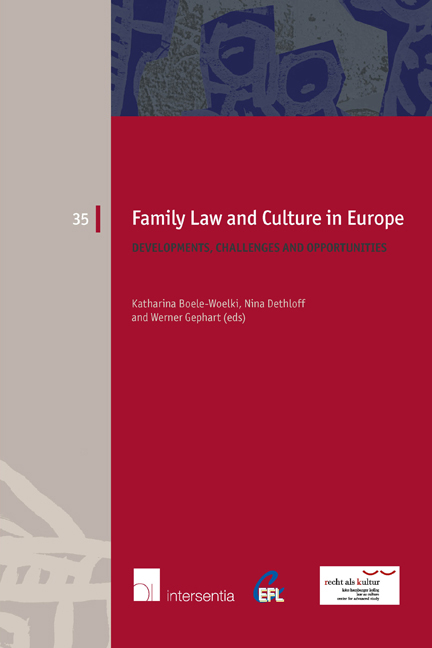Book contents
- Frontmatter
- Preface
- Contents
- List of Authors
- PART ONE THE CEFL PRINCIPLES ON PROPERTY RELATIONS BETWEEN SPOUSES
- PART TWO BREAKUP OF (NON-)FORMALISED RELATIONSHIPS
- Statutory Regulation of Cohabiting Relationships in the Nordic Countries: Recent Developments and Future Challenges
- Legislating for Cohabitation in Common Law Jurisdictions in Europe: Two Steps Forward and One Step Back?
- The Swedish Cohabitees Act in Today's Society
- Maintenance between Former Spouses and Gender Equality
- Collaborative Practice: An Interdisciplinary Approach to the Resolution of Confl ict in Family Law Matters
- PART THREE NEW CONCEPTS OF PARENTAGE
- PART FOUR INTERNATIONAL FAMILY RELATIONSHIPS
- PART FIVE TRANSNATIONAL FAMILIES: ACROSS NATIONS AND CULTURES
- EUROPEAN FAMILY LAW SERIES
The Swedish Cohabitees Act in Today's Society
from PART TWO - BREAKUP OF (NON-)FORMALISED RELATIONSHIPS
Published online by Cambridge University Press: 22 November 2017
- Frontmatter
- Preface
- Contents
- List of Authors
- PART ONE THE CEFL PRINCIPLES ON PROPERTY RELATIONS BETWEEN SPOUSES
- PART TWO BREAKUP OF (NON-)FORMALISED RELATIONSHIPS
- Statutory Regulation of Cohabiting Relationships in the Nordic Countries: Recent Developments and Future Challenges
- Legislating for Cohabitation in Common Law Jurisdictions in Europe: Two Steps Forward and One Step Back?
- The Swedish Cohabitees Act in Today's Society
- Maintenance between Former Spouses and Gender Equality
- Collaborative Practice: An Interdisciplinary Approach to the Resolution of Confl ict in Family Law Matters
- PART THREE NEW CONCEPTS OF PARENTAGE
- PART FOUR INTERNATIONAL FAMILY RELATIONSHIPS
- PART FIVE TRANSNATIONAL FAMILIES: ACROSS NATIONS AND CULTURES
- EUROPEAN FAMILY LAW SERIES
Summary
INTRODUCTION
Unmarried cohabitation (hereinafter, ‘cohabitation’) has increased considerably in Sweden during the last decades as in many other European countries. The question of if and how this increasing number of cohabiting couples should be dealt with from a legal point of view has been discussed in several European countries, resulting in a variety of legal solutions. Sweden was the first country in Europe where cohabitation was regulated in a specific statute. Cohabitation was first regulated in statutory law in 1973. The law gave an opportunity for a cohabitee with the greatest need to stay in the joint home after separation – against payment – even if the other cohabitee was the owner of the dwelling. The law was mainly protective legislation for women and children in their care, and was only applied to apartments for rent and condominiums, which at that time had no major economic value. The first rules on the division of property were introduced in 1987; the law was called the Cohabitees Joint Homes Act. The current law – the Cohabitees Act – was introduced in 2003. The legal consequences, however, are the same as in the Act from 1987. What happened in 2003 was that the law was retitled, some unclear rules were clarified, and the law became directly applicable to homosexual cohabitees.
Even though the Cohabitees Act is no more than 25 years old, society has changed quite a lot during this time in terms of our family-forming habits. The question is to what extent the Cohabitees Act functions for cohabitees in today's Swedish society? This is the overarching question I am trying to answer in an ongoing PhD project at Uppsala University. To answer this question I have carried out an empirical study that was made in 2010 in cooperation with Statistics Sweden. In the study unmarried men and women answered questions relating to the Cohabitees Act. The respondents who at the time of the survey lived in cohabitation also had to answer questions relating to their own relationship.
- Type
- Chapter
- Information
- Family Law and Culture in EuropeDevelopments, Challenges and Opportunities, pp. 95 - 108Publisher: IntersentiaPrint publication year: 2014



